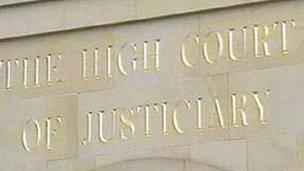Consultation on scrapping 'not proven' verdict from court trials
- Published

The government has launched a second consultation into Scots law
The Scottish government has launched a consultation on whether the "not proven" verdict should be abolished from court trials.
The announcement comes in light of Lord Carloway's review, external of Scots law.
The government also wants to hear views on increasing the size of the jury majority needed to return a verdict.
Justice Secretary Kenny MacAskill said the need to look at the issue of verdicts had arisen from feedback on the Carloway consultation.
The senior high court judge recommended in his report that the system of corroboration should be ended.
Ministers have launched the second consultation to examine the safeguards which could be introduced if that took place.
Lord Carloway had said that if it was considered necessary to look at jury majorities, then it would also be necessary to consider whether the not proven, or "third verdict", remained appropriate.
Currently a jury in Scotland can convict on a majority of eight of 15 jurors.
This latest consultation will seek views on whether there should be a change requiring a majority of nine or 10 jurors.
The issue of court verdicts has already been raised in the political arena this year.
In the summer, Labour MSP Michael McMahon launched his own consultation on whether the "not proven" verdict should remain.
He had been keen to bring in his own Holyrood bill to do away with the option for jurors.
Justice Secretary Kenny MacAskill said: "When we consulted on Lord Carloway's findings, we made clear that we were open to considering whether any additional changes to the justice system would be required in the light of his recommendation that the requirement for corroboration should be abolished.
"It is clear from the consultation responses, external we have received that the great majority of respondents think that it is necessary to consider additional safeguards, and they have highlighted, in particular, the question of jury majorities and the 'not proven' verdict.
"That is why I have decided that a further consultation on these additional safeguards to the legal system is needed, to ensure that Scotland can continue to have a legal system that is rightly regarded as one of the best in the world."
Bill McVicar, convener of the Law Society of Scotland's criminal law committee, said that if the requirement for corroboration was removed, it was vital new safeguards are looked at.
"No evidence to demonstrate that the abolition of corroboration will not result in miscarriages of justice has been produced," he said.
"In the absence of such evidence, the society believes that the abolition of the requirement for corroboration without other safeguards will simply result in a contest between two competing statements on oath and therefore have the potential to result in miscarriages of justice."
- Published29 June 2012
- Published26 October 2010
- Published20 June 2012
- Published22 May 2012
- Published13 December 2011
- Published28 March 2012